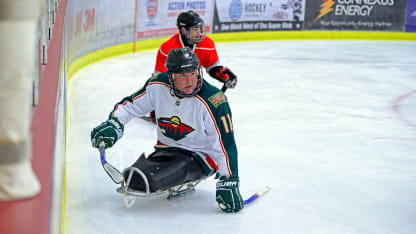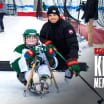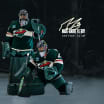Aaron Holm's first day back at work started off like so many before had.
It was January 2, 2007 -- a snowy day in Minneapolis as Holm returned to work as regional manager at an information technology and engineering consulting firm in Butler Square downtown. The Christmas and New Year's holidays had allowed him some time away from work to reconnect with family, including his wife, Amanda, and three young children.
As he was getting caught up with his team of workers, an assistant called to inform him she had issues with her car and was stranded on the side of Interstate 394. She'd be late, she told him, as she waited for a tow truck.
Local sled player finds peace on ice after accident took his legs
Aaron Holm defied death on the side of Interstate 394 a decade ago; now, he's competing for a championship at this weekend's USA Hockey Sled Classic

© Tom Morris
Holm told her not to worry and let him know if she needed any help.
About 15 minutes later, she called back and informed Holm that the truck had been called to an emergency and was no longer coming. So Holm hopped in his car to go pick up his co-worker.
Dressed in a suit and tie, Holm's intent was simply to swing by and pick up his colleague, four months pregnant at the time. But noticing it was nothing more than a flat tire, Holm figured he could have the tire changed in about 20 minutes and both could be on their way.
After successfully swapping the bad tire for the spare, Holm was throwing the damaged wheel in the trunk. It was at this moment his life changed forever.
\\\
Holm laid on the side of I-394 in shock.
As he was loading the bad tire into his co-worker's trunk, a car had entered the freeway from the Hopkins Crossroads on ramp, but never bothered to merge into the lanes of traffic. The vehicle slammed into Holm and the car he was behind, pinning him between the bumpers of the two cars.
Surprisingly, Holm never lost consciousness.
"It didn't take long for me to realize how much trouble I was in," said Holm, today a member of the Minnesota Wild-sanctioned sled hockey team competing at the
USA Hockey Sled Classic
now through Sunday at Plymouth Ice Center. "I tried to get up and couldn't. Then I turned around and saw my legs and the condition they were in.
"It really was, at that point, fight or flight. And I was ready to fight."
The paramedics arrived and loaded Holm into an ambulance, bringing him to North Memorial Hospital.
When his wife arrived, Holm grabbed her hand and told her they were going to need some help. Everything related to the accident, his injuries, and the need for a personal injury attorney were all secondary to questions about whether he would ever walk again.
"I went almost 48 hours not knowing I was never going to walk again," Holm said. "It was one of those things, maybe it was the business sense I have, but we couldn't look back. We had to look forward and figure this out."
Once it became apparent that Holm was going to lose both of his legs, he quickly turned his attention forward, managing his recovery like he would manage his business. He created groups called "project teams" that helped him and his family address the questions with his new reality.
"It was never 'poor Aaron,' it was simply, 'Hey this is your project, you go figure it how the guy is going to drive again. You go figure out how if he's going to be able to work in his office from a wheelchair. You go figure out what we need to do to the house so when he gets released from the hospital, he can get in the house and sleep in his own bed,'" Holm said. "It all started within a few hours of me being in that hospital. We took a proactive approach of recovering.
"My kids certainly weren't slowing down, so how was I going to figure out how I could stay caught up with them, how could I get back to the pace that I was at?"
In the days after the accident, Holm was introduced to a sales representative from a company called Ottobock, based in Plymouth. Ottobock is the world's largest producer and manufacturer of prosthetics in the world.
"I got to be their friend pretty quick," he said.
Within a few months, Holm was back up and taking his first steps on microprocessor-controlled knees made by Ottobock. Within five months, he was swinging a golf club and by the end of the first summer, he had 40 rounds of golf under his belt.
"It was my therapy," Holm said. "If you're going to fall down, you might as well fall down on a golf course."
Every time he got off the course, he felt more confident in the prosthetics and what they were going to do in certain situations. The sometimes hilly and varying terrains of a golf course provided him with quality testing grounds to learn how his new legs would work and how they'd react.
"You're not walking on a level gym floor, you're walking out there with undulating greens and sprinkler heads," Holm said. "The course is not flat. It'd be too easy for us if it was."
Before long, Holm returned to work but discovered it wasn't the same.
"The passion wasn't there," Holm said. "It was a high-paced, fast-paced job putting people to work on high-tech jobs. But I lost my passion and I was still trying to figure out what my life could look like depending on the products and people [I was relying on]."
So Holm resigned from his role and started Wiggle Your Toes, a non-profit organization designed to help individuals that suffer the loss of limbs, their recovery and their rehab.
"That was about the time I was introduced to sled hockey," Holm said. "But my focus at that time was just to walk. I went and checked out sled hockey, but I needed to learn to walk again."
Holm put sled hockey on the back burner for awhile and focused on the non-profit, and helping other people out and using his story and others' stories to try and motivate and inspire others.
That non-profit work is still happening today. So far, Wiggle Your Toes has helped hundreds of people around the world. Holm said he is especially proud of the work done following the Boston Marathon bombing.
One of those survivors is Jeff Bauman, who wrote the book "Stronger," which inspired a movie by the same title. In the aftermath of the bombing, Wiggle Your Toes helped Bauman purchase his prosthetics after insurance said it would cover only half the cost.
"All the people that lost limbs there, we've helped just about every single one of them in some way, shape or form," Holm said. "Whether it's financially or through modifications for their homes."
\\\
Holm grew up a hockey player in White Bear Lake, playing throughout his childhood and into middle school in the White Bear Lake Area Hockey Association.
Hockey has been a staple in Holm's adult life too. His wife played in college, and two of his sons play hockey now. One of them, Evan, organized an exhibition sled hockey contest pitting his Shakopee varsity team against his dad's Wild club this past February.
For Aaron, the fit into the sled game was natural.
The family lives on a lake, and Holm had been clearing a spot for his boys to play for years, shoveling the snow and installing lights on the family rink.
Instead of shoveling now, Holm now uses his four-wheeler to clear the ice. With a boy in high school, it'd be easy to have him clear it instead, but Holm enjoys the solitude of a quiet morning on the pond.
"It's freedom for me," he said. "I can't walk on the ice, I might as well drive around on it a little bit."
With everyone's busy schedules, Holm said the family tries a couple of times per year to get out on the pond as a crew and play hockey; his kids and his wife on skates and him on his sled.
One of those times is around Thanksgiving. Holm said he hopes its cold enough for the family to get a skate in before the chaos of the holiday season begins.
This year, that chaos includes the sled classic, presented by the NHL and hosted by the Wild and Minnesota Hockey. The four-day event, which began Thursday, runs through Sunday at Plymouth Ice Center.
A record 28 teams, all affiliated with NHL franchises, are taking part in this year's tournament. The group features more than 300 athletes, including 15 current members of the U.S. National Sled Hockey Team; 13 of those skaters helped the United States to the silver medal at the 2017 Para Sled Hockey World Championships in South Korea.
The goal is to have all 31 NHL teams represented at future events.
While the tournament has been played at different sites around the country, Holm said having the opportunity to host the tournament on Minnesota ice will provide him and his teammates with a special chance to perform in front of the home crowd.
"To be able to get friends and neighbors out there cheering on the local teams, especially the youth teams," Holm said. "I'm excited to have it on hometown ice. Hopefully it's an advantage."


















